Lawmakers want Utah’s eight public colleges and universities to cut their lower-performing programs and reinvest that money into higher-performing ones. While most of the state’s smaller schools released their plans in advance of the May 23 deadline, the two largest by enrollment — Utah Valley University and The University of Utah — had not.
Both schools' plans were made public as all of the institutions presented their approaches to the Utah Board of Higher Education Friday. The board asked questions and ultimately gave their approval. But for three schools, Utah, Weber State University and Utah State University, the approval was conditional pending more information.
Generally, the plans represent a shift away from subjects like arts, language and humanities and a push toward business and technology. In many cases, the schools simplified their course catalogs.
Utah Valley University, which has the highest enrollment in the state, plans to meet its required $8.9 million budget reinvestment by eliminating 30 academic programs, including certificates, associate’s degrees and one bachelor’s degree.
Jim Mortensen, vice president of finance at the Orem school, said there was overlap among programs, and students can transfer into similar ones.
“So we weren't eliminating the opportunity,” he said. “We're simply making for a more efficient streamlining of programs to these students.”
UVU plans to cut 18 faculty positions and 27 staff positions. That includes 13 posts that were already vacant due to a hiring freeze in the fall of 2024, Mortensen said. In reinvesting the funds, the university will add 16 faculty and 11 administrative positions.
Having more options isn’t necessarily better, leaders from Salt Lake Community College and UVU said.
“I actually read an article this morning about how having less programs is better for students, because they're not overwhelmed and confused,” said Laurie Sharp, senior associate provost for academic programs, assessment and accreditation at UVU.
With a growth student rate of 6% for the upcoming fall semester and “jam-packed” general education courses, Mortensen said the university needs to increase what it offers in that department.
“We wanted to make sure that we continue to support growth in those courses that offered strength in written communication, strength in critical thinking,” he said, noting the Utah Department of Workforce Services identifies critical thinking as a top skill.
The University of Utah also wants to hone in on “durable skills” by strengthening general education. University President Taylor Randall said new initiatives focused on American federalism and civic responsibility, along with one on civic discussion and debate, are designed to build critical thinking, communication, conflict resolution and citizenship skills.
Mitzi Montoya, provost and senior vice president for academic affairs, said the goal is to give students the skills needed to carry them into their major and beyond.
“The attempt would be to make sure that all of our students are exposed to these skills and really focus on these in a way that is connected to the classroom,” she said.
To reinvest $19.6 million of its budget, the state’s flagship university will phase out 484 courses and 94 programs, including master’s degrees in bioengineering and modern dance, for example. Some had no enrollment, while others had few students, Randall said.
Meanwhile, the university will expand its nursing and biotechnology programs, along with the College of Engineering. A new computing and engineering building is currently under construction on campus.
“We are seeing just massive growth in this area,” Randall said.
The board gave the University of Utah until September to finalize phases two and three of its plan. Randall said the uncertainty of federal grants and President Donald Trump’s big, beautiful bill for the federal budget could change how they proceed.
Randall, along with leaders from other schools, said reinvesting funds can’t be a one-time thing.
“This is clearly a larger year than usual, but if we want to achieve what we want to be as a university and how we want to serve the needs of this state, we find this moment of reinvention a moment to really focus resources in the way, hopefully, you all want,” he told the board.
The institutions will now work to finalize their plans with the Utah System of Higher Education before they are submitted to the Legislature for final approval.
Macy Lipkin is a Report for America corps member who reports for KUER in northern Utah.
Editor’s note: KUER is a licensee of the University of Utah but operates as an editorially independent news organization.






